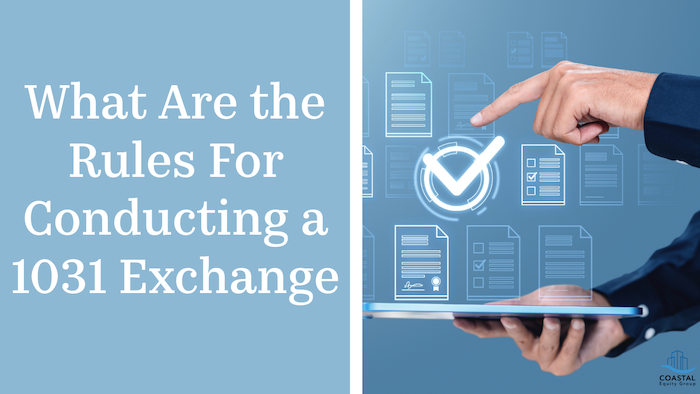
What are the rules for conducting a 1031 exchange?
For real estate investors, taxes can take a big bite out of profits, unless you know how to work the system legally. Enter the 1031 exchange, a powerful strategy that allows you to defer capital gains taxes by rolling the proceeds from one investment property into another. Sounds like a dream, right? Well, like any good tax benefit, there are rules you need to follow to make it work.
What Exactly is a 1031 Exchange?
A 1031 exchange (named after Section 1031 of the IRS tax code) lets investors defer paying capital gains taxes when they sell an investment property and reinvest the proceeds into a “like-kind” property. The key here is that you’re swapping one property for another, and as long as you follow the IRS rules, you won’t have to pay taxes on the gains (at least, not yet). This strategy allows investors to keep growing their portfolio without losing money to taxes along the way.
The Golden Rules of a 1031 Exchange
While a 1031 exchange is a great tool, the IRS doesn’t let you swap properties tax-free without some strict guidelines. Here’s what you need to know:
- Properties Must Be “Like-Kind”
You can’t exchange just anything. The properties involved must be of similar nature and use, meaning they must both be investment or business properties. You can’t swap your personal vacation home for a rental property and expect tax deferment.
- The Clock is Ticking – Watch Your Timelines!
There are two critical deadlines to follow:
- 45-Day Rule: You have 45 days from the sale of your original property to identify potential replacement properties in writing.
- 180-Day Rule: You must close on the new property within 180 days of selling the old one. Miss these deadlines, and your exchange is off the table.
- You Need a Qualified Intermediary (QI)
The IRS doesn’t let you handle the cash from the sale of your property directly. Instead, you must use a Qualified Intermediary (QI) to hold the funds and transfer them into the replacement property. If you take possession of the money at any point, the IRS considers it a taxable event.
- The New Property Must Be Equal or Greater in Value
If you buy a property worth less than the one you sold, you’ll owe taxes on the difference (called “boot”). To defer all capital gains taxes, the new property must be of equal or greater value.
- You Must Hold Both Properties for Investment Purposes
The properties involved in a 1031 exchange must be used for business or investment purposes—not as personal residences. Generally, the IRS expects you to hold the new property for at least two years to prove investment intent.
Why Investors Love 1031 Exchanges
A 1031 exchange isn’t just a tax loophole – it’s a smart investment strategy. By deferring taxes, you can reinvest 100% of your proceeds into your next deal, allowing for exponential growth over time. Understanding how to leverage this tool can make a significant impact on your long-term wealth.
How Investors Use 1031 Exchanges
Let’s say you own a rental property in Charleston, SC, that has appreciated significantly. You’re ready to upgrade to a larger multi-family property, but you don’t want to lose a chunk of your profits to capital gains taxes. Instead of selling outright, you execute a 1031 exchange, rolling your proceeds into the new property tax-free. Now, you’ve scaled up your investment.
The 1031 exchange is one of the most powerful tools in a real estate investor’s arsenal, but only if you follow the rules. Missing a deadline or mishandling funds can disqualify your exchange, leaving you with an unexpected tax bill. If you’re considering using this strategy, make sure you consult with an expert who can help guide you through the process.
While real estate investing can be complex, the right strategies can make all the difference. Want to explore more ways to maximize your investments? Keep learning, keep growing, and when the time is right, take the next step in building your portfolio.
Coastal Equity Group
15 State Street
Charleston, SC 29401
in**@****************up.com
843-737-0182
How can we help you?
Please submit your information here along with a brief message.
